11th HPV Summit renews commitment to cervical cancer-free Philippines
The Cervical Cancer Prevention Network of the Philippines (CECAP), together with the Asia & Oceania Federation of Obstetrics & Gynecology (AOFOG), the Philippine Obstetrical and Gynecological Society (POGS), and healthcare company MSD in the Philippines hold the 11th HPV Summit with a theme “A Philippines free of HPV and HPV-related cancers: How do we get there?”
In the Philippines, cervical cancer is the second most common cancer affecting women, most of whom are diagnosed during the later stages. Locally, about 7,190 new cases of cervical cancer are recorded each year, with approximately 4,088 Filipinas dying from the disease each year. The good news is that cervical cancer may be prevented through early and regular screening and vaccination.
According to the WHO’s Global Strategy to Accelerate the Elimination of Cervical Cancer, every country must reach the following global targets by 2030:
- Vaccination: 90% of girls fully vaccinated with the HPV vaccine by the age of 15
- Screening: 70% of women screened for cervical cancer using a high-performance test by the age of 35 and again by the age of 45
- Treatment: 90% of women with pre-cancer treated, and 90% of women with invasive cancer managed
National effort to achieve 90-70-90 goal
The Department of Health (DOH) has been implementing efforts to support the WHO Global Strategy.
“In 2020, 15 out of 100,000 Filipino women had cervical cancer. Our target is to reach and maintain an incidence of below four out of 100,000 women. Working towards this goal entails intensifying efforts to expand women’s access to preventive services, bring screening and early detection services closer to the people and provide holistic treatment support to reduce the burden of the disease,” said Undersecretary Dr. Ma. Rosario Vergeire, DOH Secretary-Officer-in-Charge.
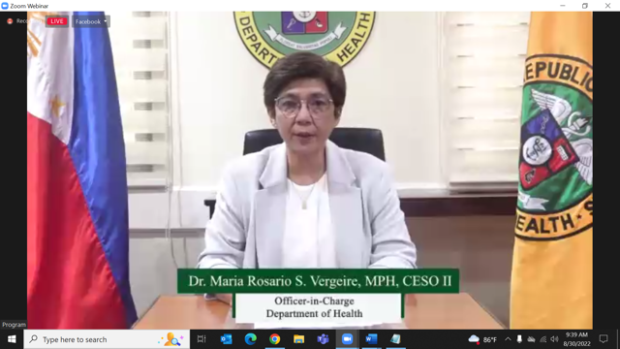
Dr. Maria Rosario Vergeire, DOH OIC, discussed the strategies implemented by DOH to achieve the 90-70-90 WHO Global Strategy.
As early as 2014, DOH piloted HPV vaccination in selected regions and expanded this critical preventive intervention over the years through varied strategic approaches that include school-based immunization strategy and HPV vaccination administered in over 100 provinces and cities nationwide.
Cancer screening and early detection interventions are available and accessible in primary care facilities and hospitals. There is a visual inspection with acetic acid and pap smear for females, which are covered by the PhilHealth Konsulta package. The DOH has also started to introduce as part of the pilot implementation of the SUCCESS project, the use of the HPV DNA screening test, piloted in 30 access sites in the Philippines.
In terms of treatment, cancer patients can avail of free medicines under the Cancer Medicine Access Program, and the release of the Cancer Assistance Fund will provide additional financial support for screening and diagnostics.
“You have the major building blocks in place to achieve elimination of cervical cancer including a school-based vaccination program that is quite vibrant and effective,” noted Dr. Mel Kohn, Public Health expert and epidemiologist at MSD. “With stakeholders’ commitment and support, I’m sure we will get there.”
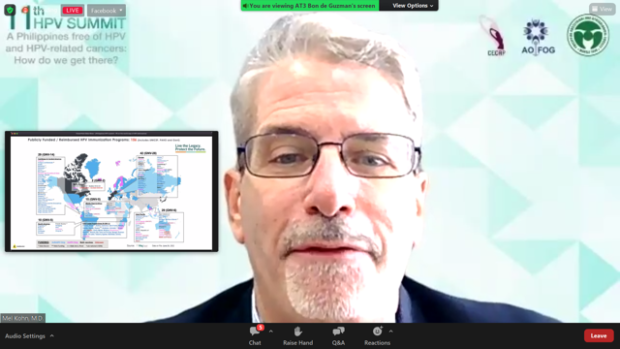
Dr. Mel Kohn, Executive Director of Vaccines and Infectious Disease Global Medical Scientific Affairs at MSD, shared how the Philippines is faring regarding HPV elimination efforts.
Local strategies to reduce cervical cancer incidence
Infection with the human papillomavirus (HPV) is a key determinant in developing cervical cancer. HPV is a virus with more than 100 types. It may cause other diseases such as oropharyngeal cancer, recurrent respiratory papillomatosis, vulvar/vaginal cancer, anal cancer, dysplasias, and genital warts.
Dr. Kim Tejano, Medical Officer at DOH, shared that as schools begin to open, the department is working closely with DepEd to resume school-based immunization. Based on the WHO SAGE recommendation, DOH is also exploring shifting to 1-dose HPV vaccination and expanding vaccination sites.
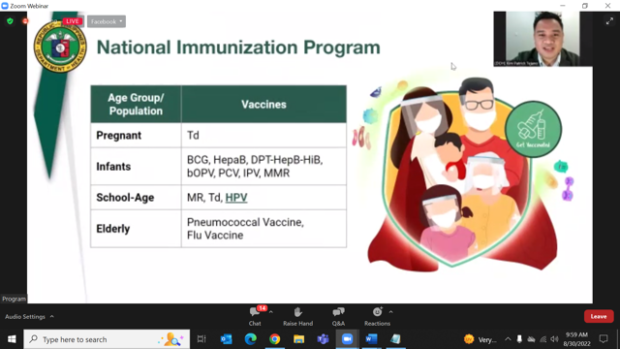
Dr. Kim Tejano, DOH Medical Officer IV, shared nationwide programs for HPV vaccination implementation.
In terms of screening innovations, the SUCCESS program is implemented in 30 project sites and will screen 40,000 women across the country. SUCCESS lead researcher Dr. Cecilia Llave said that “evidence generated from this program” will provide the basis for a national plan and “service-delivery integrated model for screening and linkage to treatment adapted to country context.”
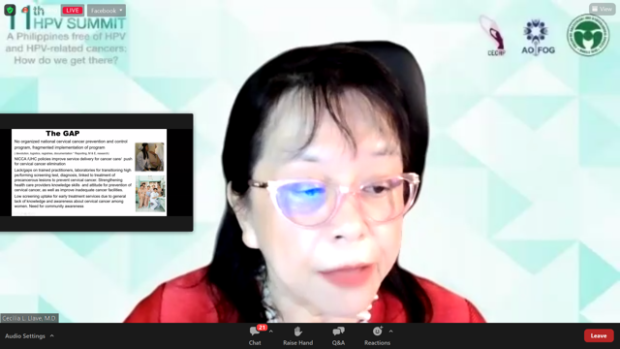
Dr. Cecilia Llave, Jhpiego Technical Adviser for Scale Up Cervical Cancer Elimination with Secondary Prevention Strategies (SUCCESS) project, shared innovative approaches to implement a robust screening program in the Philippines.
At the local government level, Quezon Governor Dr. Helen Tan shared the importance of financing for successful health program implementation. In her province, she has been implementing programs for better screening, improved healthcare delivery systems, access to treatment, and responsive palliative and survivorship care.
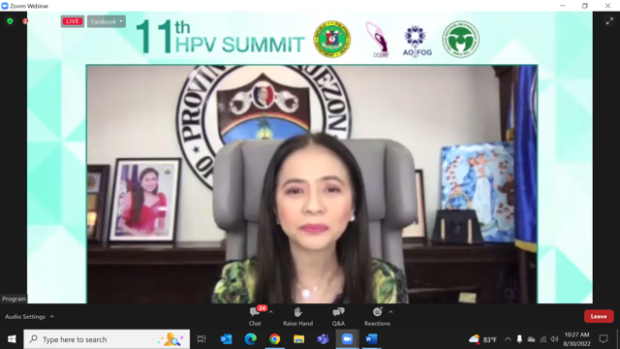
Quezon Governor Dr. Angelina Tan showcased efforts done in the provincial level to support the fight against HPV.
Renewal of commitment
With 2030 just eight years away, health professionals need to strengthen their commitment to fighting cervical cancer.
“Inequity in awareness, access, and availability are key factors in cancer control. Overcoming cervical cancer is our common goal. We must not let women die from cervical cancer. Let’s work together for a region free of HPV and HPV-related cancers,” said Dr. Kazunori Ochiai, Cervical Cancer Elimination Working Group Advisor, and AOFOG Immediate Past President.
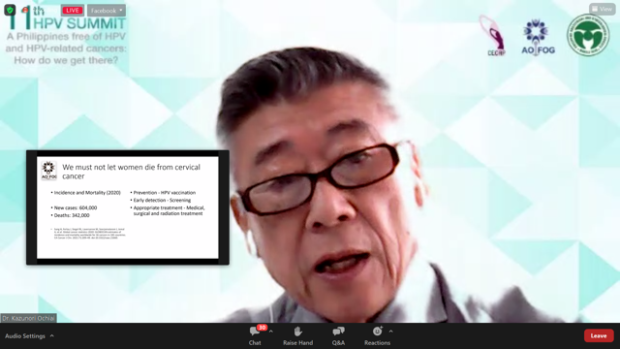
Dr. Kazunori Ochiai, Cervical Cancer Elimination Working Group Advisor and AOFOG Immediate Past President, reiterated the commitment of the region to eliminate cancer by 2030.
“As the POGS president of 2022, we commit to supporting the advocacy of achieving an HPV and cervical cancer-free Philippines. We must face challenges and overcome them, but this advocacy is a battle that must be won. And I believe that with the efforts of all stakeholders, this will be achieved by 2030,” Dr. Marlyn Dee, POGS President, responded.
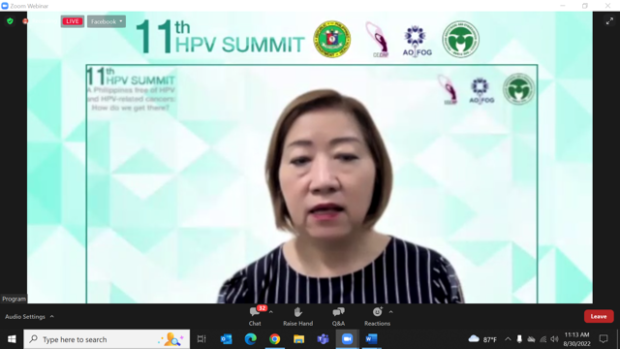
Dr. Marlyn Tan, POGS President, strengthened the commitment of Filipino doctors and stakeholders to achieve the WHO Global Strategy.
Through the combined efforts of the national and local governments and the private sector, the Philippines is well on its way to helping reduce the incidence of cervical cancer and its burden on society.
ADVT